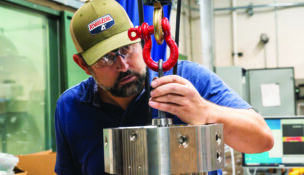Why This Year's Denver Startup Week Was More Sustainable
CSU and Denver Startup Week partnered to eliminate waste and promote green venues at the 2019 event
Alexandra MacDonald //October 8, 2019//


Why This Year's Denver Startup Week Was More Sustainable
CSU and Denver Startup Week partnered to eliminate waste and promote green venues at the 2019 event
Alexandra MacDonald //October 8, 2019//

Since 2012, Colorado State University (CSU) has partnered with Denver Startup Week (DSW) in some capacity, but this year the university made its entrance as the event’s first-ever sustainability partner.
In its new partnership role, CSU decided on two main green initiatives for the week. For one, the university aimed to provide support for sustainability efforts in 20 of the 70 venues in downtown Denver, making these spaces “Green Venues.”
To reach this goal, the university created and distributed kits to help the venues reduce waste on their own and earn the designation “Green Venue.” These kits included signs, guidelines and sustainability tips aimed at helping businesses establish zero-waste policies and practices.
And secondly, it wanted to significantly reduce waste production by the people attending. In 2018, over 17,000 people came to the week-long event and spent their time in seminars, restaurants and bus systems throughout downtown. In 2019, DSW wanted to reduce the amount of trash that would end up in landfills as a result of the increased number of people trafficking Denver’s metro areas during the event.
To successfully reduce the amount of waste, CSU contracted a Boulder-based company Eco-Cycle to manage all the zero-waste efforts at the event’s basecamp in Skyline Park.
CSU also enlisted attendees, session hosts and other DSW venues to create their own signs, t-shirts, flyers and social media posts about green efforts. These materials encouraged recycling and avoiding single-use plastics. At the end of the week, CSU covered the cost of Mile High Scraps, a compost pick-up company, for one-time pick-ups at the six participating Green Venues.
Scott Shrake, director of the Institute for Entrepreneurship at the College of Business at CSU, cited the College’s motto, “Business for a better world,” as the reason for this partnership. Sustainability in future years will require better aligning the needs of the planet and dismantling the historical business model that dominates the marketplace. Being a closed loop system, Shrake says, means that everything we do comes back to us.
Sustainability is central to the school’s values in many ways. CSU has been a leading performer in the Sustainable Campus Index, which recognizes colleges and universities in 17 sustainability impact areas. These areas include sustainable practices for academics, engagement, operations as well as planning and administration. In the 2019 Index, CSU was recognized for its impact in pubic engagement, research and campus engagement.
As for Startup Weeks in the future, Shrake says the plan is to gather a team and collectively propose ideas that are more than just surface-waste reduction. While the partnership’s impact was more than just that, successfully diverting 90% of waste from landfills into recycling and composting, the two entities see the potential for a greater effect by reaching event attendees, students and business men and women.
“The biggest misconception is that it’s an individual problem, because it really is collective. You’re not powerless, you have the power and it’s not all on you,” Shrake says.
Individuals can make an impact by supporting corporations that arrange their business practices with environmentally-aware models and exercising the right to vote on environmental matters. As for businesses wanting to make an impact, there are a few steps you can make to promote a sustainable business. This includes looking at the United Nations’ list of sustainability goals for businesses; understanding B corporations and taking the steps to certify yourself; and obtaining a Life Cycle Assessment for your company.
 Alexandra MacDonald is a second-year journalism student at Colorado State University. She participated in a partnership between the University and ColoradoBiz magazine that brought students from Fort Collins to Denver Startup Week 2019.
Alexandra MacDonald is a second-year journalism student at Colorado State University. She participated in a partnership between the University and ColoradoBiz magazine that brought students from Fort Collins to Denver Startup Week 2019.






















